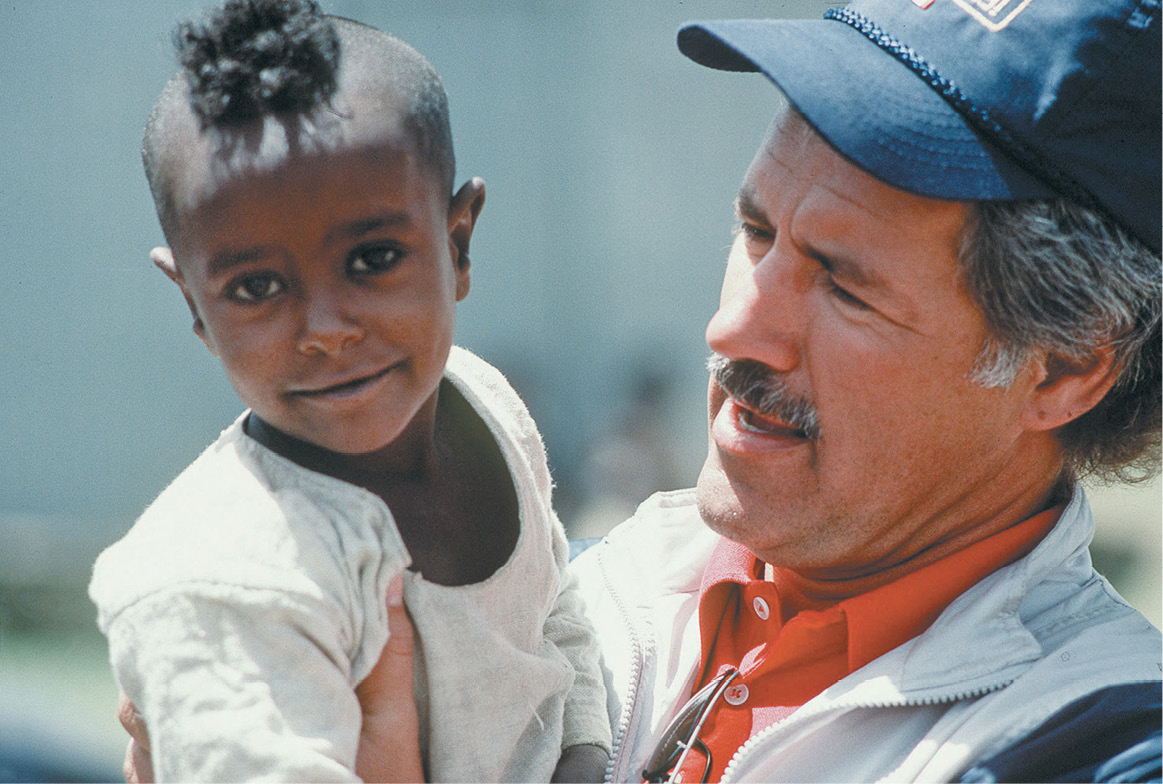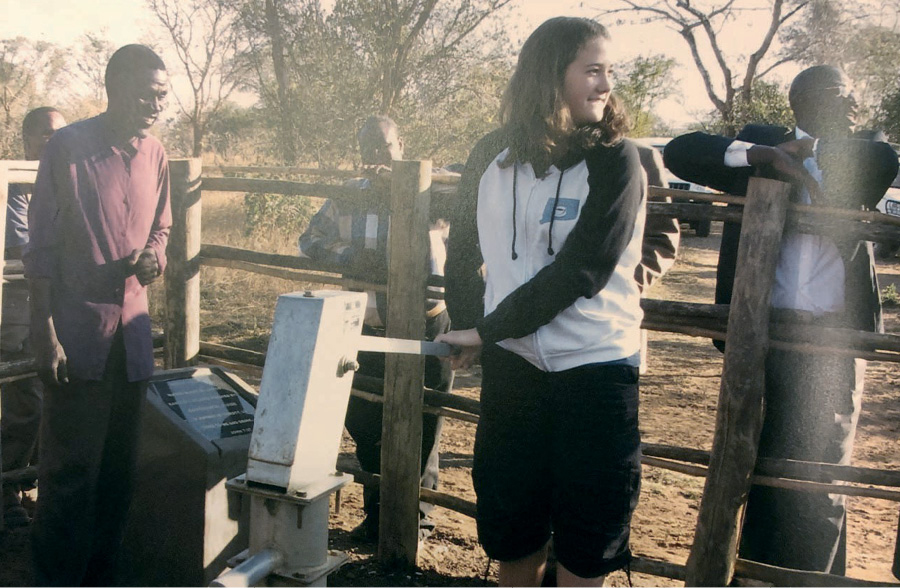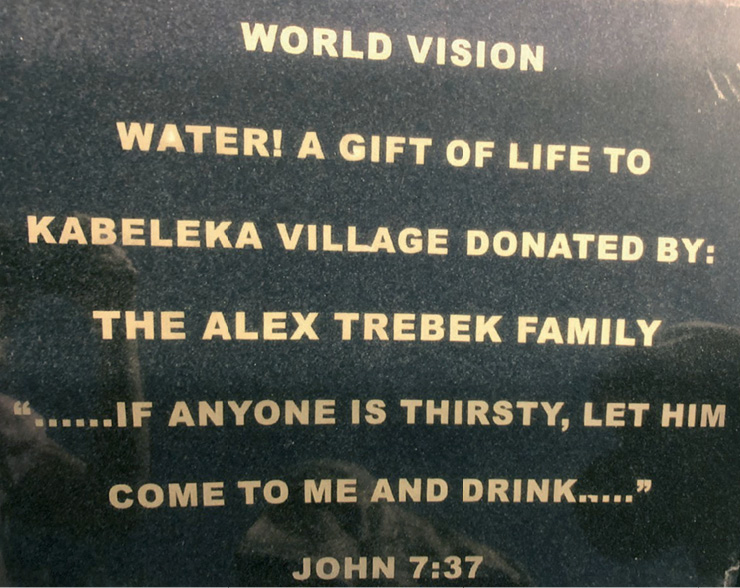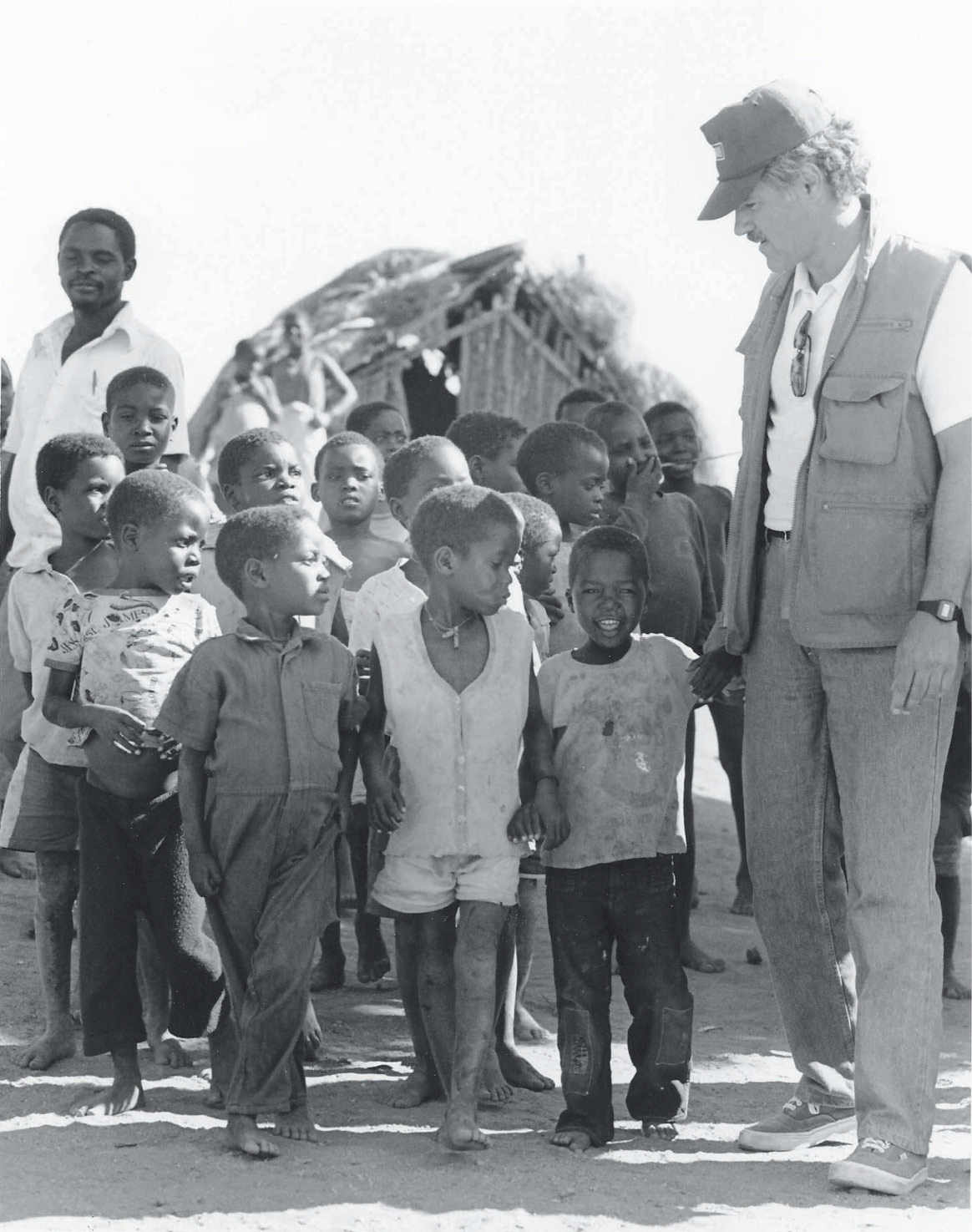The Answer Is… GIVING BACK
Around 1984, the Ethiopian famine was in the news, and they were showing all those terrible photos and film clips on television about the suffering that was going on. A friend of mine, the actress Carol Lawrence, was doing some public-service announcements about the crisis for the humanitarian organization World Vision. I called her up and said, “Is there anything I can do to help, Carol? Don’t hesitate to ask or tell them about me.”
Within a couple of weeks I got a phone call from World Vision. They said, “We got your message and would like you to join us and help out.”
They started sending me all over the world. In the more than thirty years I’ve been involved with the organization, I’ve made more than a dozen international trips—most of them to Africa. I’ve been to Ethiopia, Ghana, Nigeria, Uganda, Kenya, Tanzania, Mozambique, and South Africa. When I first went to Africa, I immediately felt at a visceral level, This is home. This is where I come from. I belong here. I feel that every time I go there. I know that’s where civilization began, and I feel it in my gut. You don’t have to tell me. There’s just something about it. I stand in Africa and I say, “I’m home.”

In Ethiopia, a mother asks me to take her child.
Once in Ethiopia, I was helping distribute food and blankets and pots and pans to families who had registered to receive help from World Vision. There was one woman who had not registered. She wasn’t on the list. She was in tears and gave me her baby.
“Take my baby,” she said. “You look after my baby.” She meant permanently. She was worried she wouldn’t be able to keep her baby alive.
There have been a lot of experiences like that with World Vision. I was in Thailand visiting an orphanage run by a priest and some nuns. There were two sections. There was an indoor section with a lot of cots where the babies were pretty sick. And there was a large outdoor playpen for toddlers who were relatively healthy. While the sister-nurse was taking me around explaining what was going on, one of the toddlers—this nude little boy—came up to my side and raised his arms. I picked him up, and I carried him around while I took the tour. At the end of the tour, I went to put him down and he started to cry. I tried to calm him down, but he was inconsolable.
“What’s wrong?” I asked the sister-nurse. “What did I do?”
“You didn’t do anything,” she said. “They have so little physical contact with human beings that once you pick them up they don’t want to let go. They feel so loved and warm. They don’t want to lose that.”
When I heard that, I started to cry myself.
In Mozambique, I ran into another little boy. He was wearing a loincloth. He had a hoop made of wire, about the size of a bicycle wheel, and a stick with a little crook in it. He would work his wheel with the stick, and just push it along. That was his toy.


In Ethiopia for World Vision. I was much younger then, and could even manage to smile while helping distribute sixty-pound bags of grain.
In Bangladesh, there was a mother of two. There was never a husband around. She was seated working in a cardboard box that was four-by-four feet. She had a two-year-old next to her and a younger infant on her chest. Her job was to smash boulders the size of a cantaloupe and break them down into much smaller pieces. Then they would use that as gravel on the road.
I thought, My God, she’s smashing these rocks and that two-year-old is sitting nearby. A small piece of stone could fly and hit that kid in the eye.
She had one pan and one sari. That was it. That’s all she owned.
When you go through experiences like these over the years and you see man’s inhumanity to man and how much suffering is out there, it affects you. You can’t stand by passively and just say, “Well, it’s not going to bother me. I’m okay. I’m going back to LA.” You want to do something. You want to help. So I continued to help World Vision, both financially and with my time.
Then one day my accountant came to me, and he asked, “Do you like the way the government is spending your tax money?”
“No,” I said.
“Would you like to have more say in it?” he asked.
“Sure,” I said.
“Well, why don’t you and Jean form a charitable foundation,” he said, “and that way you can decide where your monies are spent.”
So we did. It just changed my philosophy completely. Now instead of giving small amounts to a hundred different charities a year, I’m able to give away larger chunks, and help so many more people than before.
We’ve contributed a lot of money to my alma mater, the University of Ottawa. They were creating an alumni building and they needed money to finish it. They asked if I would help; we did, and they wound up naming it after me. We’ve supported Fordham University, our son’s alma mater, as well as the National Geographic Society. The Royal Canadian Geographical Society, whose geography bee I hosted for fifteen years, was on the verge of going belly up until we gave them some financial help. We also contribute here locally to a charity in the valley, Hope of the Valley Rescue Mission, for people who are homeless. They’re building an eighty-bed facility in North Hollywood.
A cause that I have recently taken to heart through World Vision is helping Northern Kenya deal with the problem of female circumcision. A lot of the villages marry off their girls at a very young age, twelve and thirteen, and they circumcise them. We are trying to get them to change that, and we have constructed a boarding school for girls. The girls can leave home and live there, so they don’t have to worry about being circumcised. They don’t have to be married off. They are getting an education. And they are thriving.
We also adopted Kabaleka, a village in Zambia. It has about seventeen hundred residents. They used to get all their water from one well that animals drank from. Which meant that animals also defecated right there. It wasn’t healthy for the people. And they had a two-room thatch hut as a school. So we adopted the village, and they built a new school made of blocks and mortar, with a big room for computers—even though they had no computers and they had no electricity. They built a medical facility, and they built three houses for teachers and medical personnel. And they drilled wells throughout the village.

It’s always good to receive a gift.

Collecting water in Africa is the responsibility of women and girls. Here, Emily takes her turn drawing water from the first of eight wells we drilled in Kabaleka.

A few years ago, they asked us to come and see what had been accomplished. So Jeanie, the kids, and I went. We were greeted warmly, and they were singing. I couldn’t understand a word they were saying, except “Trebek-ie! Trebek-ie!” They had a lovely banquet for us. They gave me a rooster. They gave me a goat. I realized I was going to have trouble getting them home, so I gave those away before we left.
Because it was such a success, the Zambian government was impressed and they brought in electricity from about a mile away. Since then, we have expanded the school and the medical facility, and they have built another home for the workers. Now pregnant women can go to the clinic and get a lot of prenatal childcare, ensuring they can give birth to healthier babies. Our names are tacked above some doorway. That’s nice to know.
On the other side of the coin, once a charity gets hold of you, they don’t let go. They keep coming back. What amazes me about charities these days is that I keep getting these requests in the mail: “It’s time to renew your membership.” Who made me a member? I sent you a donation. It was a donation. I did not join a club.
I got a mailer once saying, “Please help our friends, the draft horses.” I thought, Oh that’s terrible. These horses are being maligned. So I sent them a donation. Well, all of a sudden I’m on the list of animal lovers. Now I’m getting mailers from Save the Burros, Save the Mares, Save the Donkeys, Save the Tigers, Save the Lions, Dogs, and Cats. I mean, you name the animal with four legs and I’m on a list.
Another thing they do is send you an envelope with a dollar in it. So you feel bad. Oh jeez, they sent me a dollar. I’ve gotta send them something. Or they send an envelope with a stamp on it. So you say, “Well, I don’t want them to waste their stamp.” There are just so many ways in which they try to catch you. But it’s always for good causes.

In Mozambique with World Vision.
I have a joke about how many charities I contribute to. Most people contribute to charities because of personal involvement. Somebody has cancer in your family, so you’re going to support a cancer organization. Or somebody died of a heart attack, so you’ll support a heart association. I joke, because of my age, “I’ve recently been supporting the Alzheimer’s Association. Well, I think I’ve been supporting the Alzheimer’s Association. I’m not sure.”
But, hey, there’s a great need everywhere. And if you can afford it, go ahead and help them. You don’t always have to spend a ton of money to make a difference in someone’s life. I sponsor a child through World Vision—a young girl who has serious mental disabilities but is a sweet child. She’s about thirteen now. For Christmas, World Vision said if we added a hundred dollars to our donation, they would buy a present for the girl and her family. I figured on clothes, but I got a notice the other day that they bought a mattress for the girl. She needed a mattress. They included a photo of her hugging her new mattress. We can make differences in simple ways and significant ways that don’t cost much.